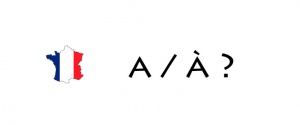Difference between revisions of "Language/French/Grammar/When-Use-à-or-a"
m (Quick edit) |
m (Quick edit) |
||
| Line 1: | Line 1: | ||
{{French-or}} | {{French-or}} | ||
[[File:a-à.jpg|thumb]] | [[File:a-à.jpg|thumb]] | ||
<div style="font-size:300%;">How to know when to write "à" or "a" in a sentence?</div> | <div style="font-size:300%;">How to know when to write "à" or "a" in a sentence?</div> | ||
In this lesson you will learn how to make the difference between "à" and "a" in French. | In this lesson, you will learn how to make the difference between "à" and "a" in French. 🇫🇷 Many native French speakers still make mistakes with these two words, even though the rule is quite simple. Once you've mastered this concept, you can also explore other related French grammar topics, such as [[Language/French/Grammar/The-plural-of-compound-nouns|plural of compound nouns]], [[Language/French/Grammar/Negation|negation]], and [[Language/French/Grammar/Direct-object-quantifiers-and-«-en-»|direct object quantifiers and « en »]]. So, let's dive into the world of French grammar and improve your language skills! 📚 | ||
==When use "a"?== | ==When use "a"?== | ||
'''a:''' form of the verb to have (avoir) at the 3rd person singular. | '''a:''' form of the verb to have (avoir) at the 3rd person singular. | ||
| Line 65: | Line 59: | ||
<youtube>TrUXI8FgmKY</youtube> | <youtube>TrUXI8FgmKY</youtube> | ||
== | ==Other Lessons== | ||
* [[Language/French/Grammar/Often-Mistaken-Gender-of-Nouns|Often Mistaken Gender of Nouns]] | * [[Language/French/Grammar/Often-Mistaken-Gender-of-Nouns|Often Mistaken Gender of Nouns]] | ||
* [[Language/French/Grammar/Adverbs-ending-in-—ment-derived-from-the-feminine-form-of-an-adjective|Adverbs ending in —ment derived from the feminine form of an adjective]] | * [[Language/French/Grammar/Adverbs-ending-in-—ment-derived-from-the-feminine-form-of-an-adjective|Adverbs ending in —ment derived from the feminine form of an adjective]] | ||
| Line 76: | Line 70: | ||
* [[Language/French/Grammar/Coordination-of-subject-pronouns|Coordination of subject pronouns]] | * [[Language/French/Grammar/Coordination-of-subject-pronouns|Coordination of subject pronouns]] | ||
* [[Language/French/Grammar/An-adjective-agreeing-with-nouns-linked-by-et,-ou-or-ni|An adjective agreeing with nouns linked by et, ou or ni]] | * [[Language/French/Grammar/An-adjective-agreeing-with-nouns-linked-by-et,-ou-or-ni|An adjective agreeing with nouns linked by et, ou or ni]] | ||
<span links></span> | |||
Revision as of 22:33, 24 March 2023
| When use: Quand or Quant? | Ou or Où? | a or à? |
In this lesson, you will learn how to make the difference between "à" and "a" in French. 🇫🇷 Many native French speakers still make mistakes with these two words, even though the rule is quite simple. Once you've mastered this concept, you can also explore other related French grammar topics, such as plural of compound nouns, negation, and direct object quantifiers and « en ». So, let's dive into the world of French grammar and improve your language skills! 📚
When use "a"?
a: form of the verb to have (avoir) at the 3rd person singular.
So it is used with "Passé composé" for example.
- Elle a mangé / She has eaten
TIP: You can substitute with have at the past : "avait"
- Example: Il a trouvé une perle. ---> Il avait trouvé une perle.
When use "à"?
à: preposition or part of a prepositional phrase (because of, from, etc.). It introduces an indirect object of the verb.
TIP: You cannot replace with "avait".
- Example: Loulou est partie à Québec. ---> Loulou est partie
avaitQuébec
"à" is not a verb.
"à" is like "to" in sentences. (When used with the verbs, but not for places or gentive)
Note : "à" is in singular, in plural it is "aux"
- C'est à moi / It's mine
- Tu es à Orléans / You're in Orléans
- Je veux à boire / I want a drink
Pronunciation
"à" and "a" are pronounced the same. So if you talk to a french, don't worry about that ;)
Exercise
It's your turn. Find the right answer:
- Il est à/a toi.
- Il à/a déjà terminé?
- À/a tout à/a l'heure!
- Des choux à/a la crème.
- Il à/a presque tout à/a côté de lui.
Video
Other Lessons
- Often Mistaken Gender of Nouns
- Adverbs ending in —ment derived from the feminine form of an adjective
- Formation of the passive in French
- Compound nouns
- Subject verb agreement — Verb “être”
- Ce, and compound forms of être
- Use of the definite article with titles
- Omission of plural indefinite des after the preposition de
- Coordination of subject pronouns
- An adjective agreeing with nouns linked by et, ou or ni
